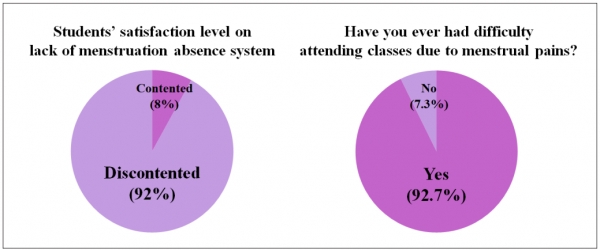
Often in the mornings, students sigh on the school online community Everytime that they have to drag themselves to school despite their period cramps.
What these and many other students are asking for in unison is the menstruation absence system. Menstruation absence is a system that officially permits absences from classes due to menstrual pain, which has been in effect in elementary, middle and high schools nationwide since 2006 at the recommendation of the National Human Rights Commission of Korea. Universities that have not implemented the system remain subject to recommendation.
Ewha Womans University is one of the schools that have not enacted the system. No official clauses on menstruation absence exist within the school rules, and the permission of attendance is left to the discretion of individual professors. Some professors exceptionally allow menstruation absences based on their own standards, such as submitting evidential documents or contacting without evidence, yet only in rare instances has this been done at Ewha.
Then, what is the situation at other universities? A number of universities located in Seoul, including Yonsei University and Hankuk University of Foreign Studies, have implemented the menstruation absence system.
Moreover, a number of other women’s universities in Seoul with an absolute majority of female students on campus have implemented the system as well. These include Sookmyung Women’s University, Seoul Women’s University, and Duksung Women’s University.
With so many universities, both women’s and co-ed, implementing the system, why has Ewha thus far refused? Some have raised the possibility that the system may be misused or abused. Ewha students who are concerned about the issue also agree that the introduction of the system should be considered carefully, as it can be abused by some students whose menstrual pains are not severe.
The school takes a similar stance for not having a system. The Department of Academic Affairs explained that the system has not been introduced so far as the quality of classes could decrease if the system is misused or abused. It is important not to make rash decisions about introduction since university classes are highly autonomous, and since there may be complaints raised by professors and students who do not use the system. Yet, the official added that several discussions had taken place at the request of the student council, leaving room for careful approach and consideration if sufficient understanding and consensus are reached among professors, students, and the school.
According to an Ewha Voice survey conducted from April 19 to 25, 124 students showed keen interest in the issue. In total, 115 reported that they had difficulty attending classes due to menstrual pains, and of these, all but one who had those experiences were discontented with the lack of a menstruation absence system in the school. Among those students, 76.7 percent recalled situations when they were forced to attend school and endure the pain. Furthermore, 20.7 percent shared they took a so-called “self-cancellation” day (jachehyugang ), referring to students deciding not to attend classes. Only three responded that they had visited a hospital and submitted a medical certificate to the professor.
“When I did not get my attendance grade because of menstrual pain, I had to accept the situation as a rule of the school,” said Kim Minkyung, a junior majoring in the Department of Architectural & Urban Systems Engineering. “But it is also true that I honestly felt a sort of unfairness.”
Some students doubted that the school lacks consideration and care for students.
“This is an inevitable problem most of our students are experiencing and suffering from, and I cannot understand why the school makes no effort to deal with it,” claimed one respondent who wished to remain anonymous. “It just makes me think there is not even basic consideration at school for students.”
Another respondent also complained that the school seems to have no sensitivity to the problem, even though Ewha students are all women.
According to the survey, 16 percent of the classes that respondents took permitted menstruation absence, while the remaining 84 percent did not. Moreover, even some students among the 16 percent found it inefficient to spend their time and medical expenses visiting tertiary hospitals only for certificates to be submitted to the school without any other treatment.
“I would have already gone to school, not a hospital, if it had not been too hard to even move,” lamented another student who wished to remain anonymous.
Finally, when asked their thoughts about the need for the menstruation absence system, only 2.5 percent of respondents thought it unnecessary, while 84.7 percent demanded the introduction of the system. On the other hand, the remaining 13 percent thought that it would be good to introduce the system but still acceptable to not have it.

